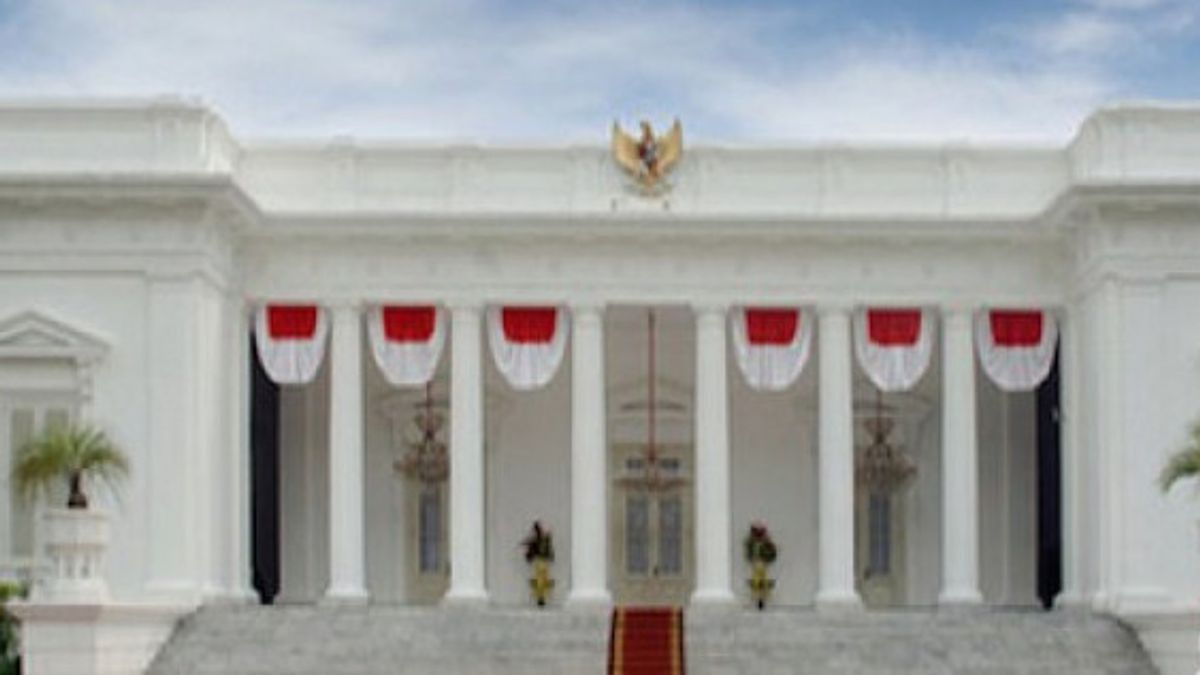YOGYAKARTA The Indonesian presidential palace is not only in Jakarta, but is scattered in a number of areas.
At least six presidential palaces owned by Indonesia, including the State Palace, Merdeka Palace, Bogor Palace, Yogyakarta Palace, Cipanas Palace, and Tampaksiring Palace.
The following is a complete explanation of six Indonesian presidential palaces spread across various regions.
Indonesian Presidential Palace
The state Palace is a place that is used as a center for state government activities as well as the implementation of state events, such as the inauguration of important state officials, as well as the opening of a national and international congress.
Quoted from the State Secretary (Sesneg) website, the State Palace is located on Jalan Veteran and faces the Ciliwung River. This palace has its back to the Merdeka Palace which faces the National Monument Park and is connected by the Central Court. The State Palace environment includes several other buildings, namely the Presidential Office, State Wisma, Baiturrahim Mosque, and the Presidential Palace Museum.
The State Palace was originally the private residence of a Dutch citizen, JA Van Braam. He built this building in 1796 during the reign of Governor General Pieter Gerardus van Overstraten until 1804 during the reign of Governor General Johannes Sieberg.
In 1816, the residence of JA Van Braam was taken over by the Dutch East Indies government and used as a center for government activities and the private residence of the governor general.
After the Proclamation of Indonesian Independence, the State Palace witnessed the signing of the script for Linggarjati's approval on March 25, 1947.
The Merdeka Palace is the official residence and office of the President of Indonesia. The Merdeka Palace was used as the president's residence during President Soekarno's time.
The Merdeka Palace was built in 1796 and called the Risjwijk Palace. The Merdeka Palace is located on Jalan Merdeka Utara. The building is facing the National Monument Park (Monas).
In the early days of the government of the Republic of Indonesia, this palace witnessed the signing of a manuscript on the recognition of the sovereignty of the Republic of Indonesia by the Dutch government on December 27, 1949.
The Bogor Presidential Palace is located on Jalan Ir. H. Juanda No.1, Paledang Village, Central Bogor City District, Bogor City, West Java Province.
The Bogor Palace was established on an area of 28.86 hectares with an altitude of 290 meters above sea level.
The Bogor Palace began with the search for Dutch people who worked in Batavia (now Jakarta) for places they wanted to live as resting places.
At that time, they thought that Batavia's city was too hot and too crowded so they needed to find cool places outside the city of Batavia.
In addition to the Dutch, the Governor-General of the Netherlands, GW Baron van Imhoff, also conducted such a search and managed to find a good and strategic place in a village, named Kampong Baroe, on August 10, 1744.
In 1975, Governor-General van Imhoff ordered the construction of the place of choice as an official named Buitenzorg (meaning 'problem-free'.
Buitenzorg was handed over to the Indonesian government after the Dutch Kingdom recognized Indonesia's sovereignty de jure through the Round Table Conference (KMB) which was held in The Hague.
The Yogyakarta Palace was built in May 1824. The Yogyakarta Presidential Palace is also known as the Great Building or State Building. The naming is related to one of the functions of the palace's main buildings, namely as a place for reception of Supreme Guests.
The Yogyakarta Presidential Palace was originally the residence of an 18th resident named Anthonie Hendriks Smissaet.
The Great Building has an important role for Indonesia. Where he became the presidential palace and the residence of President Soekarno when the capital city of Indonesia was moved from Jakarta to Yogyakarta during the Second Dutch Military Aggression.
Built in 1740, the Cipanas Palace was originally the residence of a Dutch host, named Van Heots.
In 1743, this building became the resting place for the governor generals of the Netherlands, because the location was very cool and fresh.
The Cipanas Palace is located at the foot of Mount Gede, Cianjur, West Java. The Cipanas Palace is built on an area of 7,760 square meters at an altitude of 1,100 meters above sea level.
After Indonesia's independence, the Cipanas Presidential Palace was used as a resting place for the President or Vice President of the Republic of Indonesia.
SEE ALSO:
The Tampaksiring Palace is the only Presidential Palace that was built after the Indonesian Merdekaaan era.
Located in Gianyar Regency, Bali, Tampaksiring Palace was built from 1957 to 1960 by President Soekarno.
The function of the Presidential Palace Tampaksiring from the start was as a resting place for the President of the Republic of Indonesia and his family and for State guests.
In addition, Presidential Palace Tampak Siring is also often used by President Soekarno as a place to seek inspiration, formulate thoughts, and write down his speeches.
This is information about the Indonesian Presidential Palace. Hopefully this article can add insight to the loyal readers of VOI.ID.
The English, Chinese, Japanese, Arabic, and French versions are automatically generated by the AI. So there may still be inaccuracies in translating, please always see Indonesian as our main language. (system supported by DigitalSiber.id)













